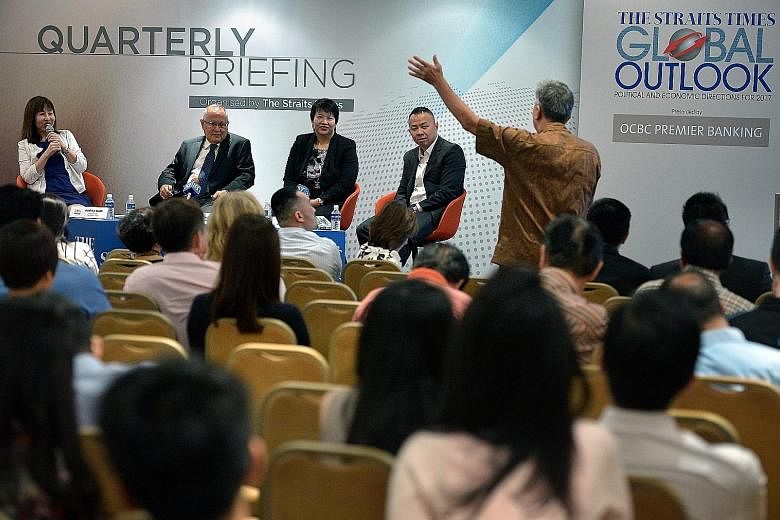Aman Abdurrahman, the terrorist believed to be the mastermind of last month's attack in Jakarta, is now Indonesia's most dangerous radical ideologue.
He takes over that mantle from Abu Bakar Bashir, the spiritual leader of the now disbanded Jemaah Islamiah (JI) terror network, The Straits Times Indonesia bureau chief Francis Chan said, citing security analysts.
Mr Chan was speaking at the first of three quarterly briefings leading up to the annual Global Outlook Forum organised by The Straits Times.
The focus yesterday was on the challenges Indonesia faces in its battle against terrorism and over its economic propects.
Bashir, 76, has "lost the respect" of many Indonesian extremists, Mr Chan told participants at the briefing. Attitudes towards Bashir shifted after he appealed against his conviction in court that he had helped to fund a terrorist paramilitary training camp in Aceh, Mr Chan said.
Bashir had earlier rejected the court's authority and his appeal showed that he accepted the power of a secular government. He also said that he was misled into pledging allegiance to the Islamic State in Iraq and Syria (ISIS).
Another crucial difference is that Bashir's Al-Qaeda-linked JI network focused its attacks mainly on Western targets and non- Muslims. The 44-year-old Aman, who has pledged support for ISIS, has been able to win over more radical militants with his extreme "takfiri" doctrine that justifies attacks on those deemed to be nominal Muslims.
Followers of Aman's group, Jemaah Anshar Khilafah, have also been known to target Muslims accused by them of apostasy or deemed impure.
This difference in outlook was evident in last month's brazen bombing of a Starbucks outlet and a police post in downtown Jakarta in which eight people died, including the four terrorists. Three of the others killed were Indonesians, and the fourth was a Canadian.
The Indonesian prison authorities recently acknowledged Aman's pervasive influence, although he has been in jail for six years, and took steps to isolate him by severely limiting the visitors he could have.
Yesterday's briefing, which attracted some 200 participants, was organised in partnership with sponsor OCBC Premier Banking.
Another speaker, Mr Barry Desker, a former Singapore envoy to Indonesia, said the terrorism challenge will be a long-drawn battle that will need to confront the seeping conservative Wahhabi doctrine from Saudi Arabia that analysts say fuels extremist movements.
To stamp out terrorism, he said, deradicalisation measures must also target women and children because the scourge of extremist ideology has long-term multi-generational consequences.
He pointed to recent news reports that Dwi Djoko Wiwoho, director of the Indonesia Investment Coordinating Board's licensing office in Batam, joined ISIS and went to Syria because of pressure from his wife.
Of the 400 Indonesians who have joined ISIS, 45 per cent are women and children, terrorism analyst Sidney Jones recently said.
Mr Desker warned that the regional fight against terrorism was made harder by militants, kidnappers and smugglers who flit across borders in a large "ungoverned area" in South-east Asia. He referred to cross-border movements in the southern Philippines, east Kalimantan and central Sulawesi.
Regional governments must thus step up the sharing of information and coordinating security measures, said Mr Desker, a distinguished fellow at the S. Rajaratnam School of International Studies at Nanyang Technological University.
"JI and now ISIS activists operate very freely across borders, and states have had to come to terms with this."
The Straits Times' next quarterly briefing under the Global Outlook series will be held in May while the main forum will be in November.
For more on The Straits Times Global Outlook Quarterly Briefings, go to http://str.sg/globaloutlook


